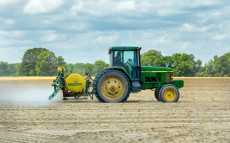- pathfindersAI
- Job Profile
Farmworkers and Laborers, Crop, Nursery, and Greenhouse
Summary
Farmworkers and Laborers, Crop, Nursery, and Greenhouse
What They Do
Farmworkers and laborers in the domains of crop, nursery, and greenhouse operations are fundamental players in the agricultural industry. They engage in the essential tasks that ensure the cultivation and harvesting of a variety of plants, from vegetables and fruits to flowering plants and ornamental trees. Their work is integral to food production and landscape beautification, making these laborers vital to both local economies and global food supply chains. The daily rhythm of a farmworker's life is dictated by the seasons and the needs of the plants they nurture, requiring both physical endurance and a deep connection to the land.
Job Responsibilities
The specific responsibilities of farmworkers and laborers vary depending on the type of crops or plants they are managing. Generally, their duties include planting seeds, tending to the growth of plants, applying fertilizers and pesticides, irrigating fields, and harvesting crops. In a nursery or greenhouse setting, they might also be involved in transplanting seedlings, pruning plants to encourage healthy growth, and preparing plants for sale. Additionally, they may operate and maintain agricultural machinery, monitor the health of plants for signs of disease or distress, and ensure that environmental conditions, such as temperature and humidity, are optimal for plant growth. Effective communication with supervisors and adherence to safety protocols are also critical aspects of their role.
Essential Skills
Farmworkers and laborers must possess a range of skills to be effective in their roles. Physical stamina and strength are paramount, as the job often involves long hours of repetitive, labor-intensive tasks under varying weather conditions. Attention to detail is crucial for tasks such as planting and harvesting, where precision impacts the yield and quality of crops. Basic knowledge of agricultural machinery and the ability to identify and address the health needs of plants are also important. Furthermore, effective time management, teamwork, and basic problem-solving skills help ensure that tasks are completed efficiently and any issues that arise are swiftly addressed.
Educational Pathways
While formal education is not always required for entry-level positions, a high school diploma or equivalent can be beneficial. Prospective farmworkers and laborers can enhance their employability and career advancement opportunities through vocational training programs or community college courses related to agriculture, horticulture, or agronomy. These programs may cover topics such as soil health, pest management, and modern farming techniques. Additionally, hands-on experience through internships or cooperative education programs can provide valuable practical skills and insights into the industry. For those looking to advance into supervisory or specialized roles, further education such as an associate's degree in agricultural sciences can be advantageous.
Career Prospects
The demand for farmworkers and laborers remains steady due to the perennial need for food production and plant cultivation. Job opportunities are often seasonal, with peak periods during planting and harvest times. However, positions in nurseries and greenhouses can offer more stability and year-round employment. As agricultural technologies evolve, there are growing opportunities for skilled laborers to engage with more sophisticated machinery and sustainable farming practices. While the entry-level pay may be modest, experience and advanced skills can lead to higher wages and more specialized roles, including supervisory positions or roles in agricultural management and technology.
Conclusion
Farmworkers and laborers in crop, nursery, and greenhouse settings play an indispensable role in maintaining the health and productivity of agricultural operations. Their diverse responsibilities and essential skills make them key contributors to both the local and global food supply. Educational pathways offer opportunities for skill development and career advancement, while the enduring need for agricultural labor ensures a stable demand for these professions. For those with a passion for working with plants and the resilience to meet the physical demands of the job, this career offers the fulfillment of fostering growth and contributing to essential agricultural production.
Video
Compensation
| State | Median Salary | Median Hourly | Positions |
|---|---|---|---|
| AL | 31,850 | 15.31 | 800 |
| AK | 34,720 | 16.69 | 120 |
| AZ | 32,920 | 15.83 | 6,470 |
| AR | 29,730 | 14.29 | 390 |
| CA | 34,670 | 16.67 | 171,620 |
| CO | 37,310 | 17.94 | 2,150 |
| CT | 32,750 | 15.75 | 460 |
| DE | 27,570 | 13.25 | 250 |
| FL | 28,520 | 13.71 | 10,980 |
| GA | 30,160 | 14.50 | 1,820 |
| HI | 35,310 | 16.98 | 710 |
| ID | 30,810 | 14.81 | 1,940 |
| IL | 36,340 | 17.47 | 2,020 |
| IN | 35,360 | 17.00 | 1,140 |
| IA | 37,390 | 17.98 | 640 |
| KS | 34,320 | 16.50 | 770 |
| KY | 30,220 | 14.53 | 360 |
| LA | 28,500 | 13.70 | 530 |
| ME | 37,930 | 18.24 | 590 |
| MD | 35,030 | 16.84 | 1,700 |
| MA | 38,790 | 18.65 | 1,210 |
| MI | 35,520 | 17.08 | 3,230 |
| MN | 35,730 | 17.18 | 1,350 |
| MS | 36,860 | 17.72 | 230 |
| MO | 38,420 | 18.47 | 1,350 |
| MT | 39,180 | 18.84 | 400 |
| NE | 37,170 | 17.87 | 280 |
| NV | 34,680 | 16.67 | 510 |
| NH | 32,130 | 15.45 | 320 |
| NJ | 35,160 | 16.90 | 3,430 |
| NM | 28,320 | 13.62 | 1,890 |
| NY | 37,310 | 17.94 | 3,340 |
| NC | 31,070 | 14.94 | 1,700 |
| ND | 29,120 | 14.00 | 120 |
| OH | 34,930 | 16.79 | 2,410 |
| OK | 33,360 | 16.04 | 1,610 |
| OR | 33,760 | 16.23 | 7,980 |
| PA | 31,830 | 15.30 | 2,160 |
| RI | 35,520 | 17.08 | 140 |
| SC | 31,720 | 15.25 | 750 |
| SD | 30,450 | 14.64 | 240 |
| TN | 33,190 | 15.96 | 2,220 |
| TX | 30,940 | 14.87 | 4,630 |
| UT | 36,540 | 17.57 | 550 |
| VT | 40,160 | 19.31 | 140 |
| VA | 34,580 | 16.63 | 1,390 |
| WA | 34,980 | 16.82 | 8,280 |
| WV | 27,700 | 13.32 | 80 |
| WI | 34,040 | 16.37 | 1,150 |
| WY | 33,500 | 16.11 | 110 |
Similar Occupations
In this area you will find other occupations that are close to the one you were viewing in tasks, knowledge and work environment. If the primary job profile you are viewing isn't quite to your liking, take a look around and see what else is available.
Basic and Premium Accounts have more alternative occupations available than the Free account.

Agricultural Equipment Operators - 45-2091.00
Agricultural Equipment Operators are responsible for driving and controlling farm equipment such as tractors, harvesters, and irrigation machines to plant, cultivate, and harvest crops. They perform routine maintenance on machinery, ensuring it functions efficiently to maximize farm productivity.
-
$39,690/yr
Median Pay -
28,910
Number of Jobs

Fallers - 45-4021.00
A faller is a skilled professional responsible for felling trees in forests, typically using chainsaws or other specialized equipment to cut down timber while ensuring safety and precision. Their work involves assessing tree behaviors, planning cutting angles, and minimizing environmental impact during the logging process.
-
$53,170/yr
Median Pay -
4,800
Number of Jobs